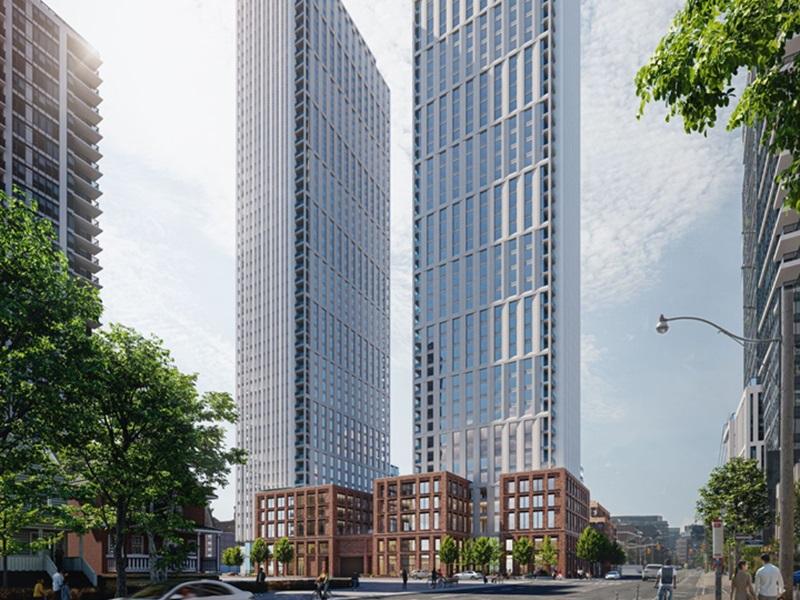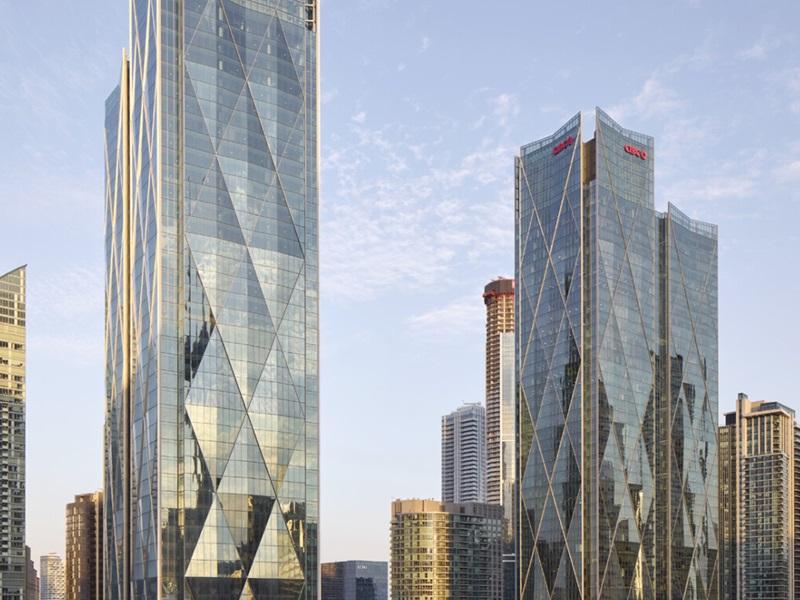
Patricia Arsenault, executive vice-president of research consulting for Altus Group Data Solutions, opens Altus’ 12th annual Toronto State of the Market event. (Steve McLean RENX)
“The GTA remains a very attractive place to put your real estate dollars,” said Patricia Arsenault, executive vice-president of research consulting for Altus Group Data Solutions, while opening Altus Group’s recent 12th annual Toronto State of the Market event.
Arsenault and Altus Group Data Solutions vice-president of data operations Raymond Wong covered a wide range of topics related to the Greater Toronto Area commercial and residential real estate markets in front of a large audience at the Fairmont Royal York Hotel’s Concert Hall.
Commercial property transactions in the GTA totalled $22.6 billion in 2019, up seven per cent from 2018 and the second-highest level on record next to 2017. Q4 activity of $7.8 billion set a record.
Investment transactions involving improved properties rose by 16 per cent to $14.7 billion and investment transactions involving land decreased by six per cent to $7.9 billion.
In the various key sectors:
* residential land sales declined 12 per cent to $5.1 billion;
* industrial, commercial and institutional land sales rose seven per cent to $2.8 billion;
* office sales rose two per cent to $4.1 billion;
* retail sales dropped six per cent to $2.3 billion;
* industrial sales increased 31 per cent to $4.4 billion;
* apartment sales were up 40 per cent to $3.8 billion;
* and hotel sales dropped 26 per cent to $0.1 billion.
Industrial, office and apartment investment sales all set records.
What investors want
Investors most covet multi- and single-tenant industrial, industrial land and suburban multiple-unit residential properties, according to Wong.
Seniors housing, data centres, self-storage and cold-storage facilities are also in demand as investors diversify their portfolios.
Canadian private investors are the most prevalent buyers in the GTA in almost all asset classes, totalling almost $12 billion in 2019.
Developers were second at more than $3 billion, with a large majority of that total being residential land. The next biggest buyers, in order, were institutions, users, Canadian public investors, builders, governments and foreign investors.
“Investors are being a little bit more selective on pricing with the assets they’re targeting,” said Wong. “You’re not seeing, compared to two or three years ago, lineups of 10 or 15 bidders on particular properties.
“You’re seeing a little bit less and you’re seeing buyers being more diligent with respect to returns and anticipated yields. But, overall we still see Toronto as a prime market for both foreign and domestic buyers.”
Office vacancies, leasing and rents
New office space completions declined 20 per cent to one million square feet in 2019, due more to construction timelines than a lack of demand.
Office vacancy rates continued to shrink, with the technology sector dominating absorption and pre-leasing. Seventy-five per cent of the office space under construction in Toronto is pre-leased.
The financial services sector has always been the main driver of Toronto office demand and accounted for 37 per cent of GTA leasing activity in 2019. It was followed by business and professional services at 24 per cent, tech at 19 per cent, government at 11 per cent, manufacturing at five per cent and co-working at four per cent.
“A lot of that space that’s being leased by financial services is tech-related,” said Wong.
The downtown Toronto office vacancy rate is 3.2 per cent, while it’s 10.3 per cent in the suburbs.
Some suburban office space doesn’t meet the needs of current tenants. As a result, Wong expects more redevelopment and mixed-use developments, particularly at retail sites with public transit access, to meet the demand.
A shortage of new office supply is forecast through 2024. With construction costs expected to increase 10 to 15 per cent over the next five years, rents of $95-plus per square foot will be needed to justify new construction.
“That’s not uncommon for Manhattan, Seattle or San Francisco,” said Wong. “Downtown Toronto still has plenty of runway based on being a transportation hub and the demographics of people still wanting to be downtown.”
Industrial vacancies, leasing and rents
New industrial space completions rose 35 per cent to 8.1 million square feet in 2019.
“That was a welcomed situation in a market that desperately needs some additional space,” said Arsenault.
However, the industrial sector remains under-supplied. Pre-leasing activity in buildings under construction has been strong, as just 36.9 per cent of the approximately 15 million square feet of space under construction in Toronto is available. The industrial space availability rate is just 1.9 per cent in the GTA.
There was a big spike in industrial rents from 2018 to 2019, especially newer buildings with higher ceiling heights. Wong said both rents and sale prices will continue to climb.
“For institutional investors, this is a great asset to have, especially if e-commerce continues to grow.”
Office preferences

Ray Wong, vice-president of data operations for Altus Group’s Data Solutions division. (Courtesy Altus)
A trend among tenants to shorter leases – one or two years instead of five to 10 – has led to the growth in co-working spaces. There are 35 different co-working companies or concepts in the GTA, according to Wong.
Three very different generations of workers are now sharing office space, which Wong said can present additional challenges.
What tenants want most are: abundant natural light; coffee shops; free WiFi; room sensors and temperature controls; efficient elevators; soundproofing; and the ability to receive packages.
The desire for abundant natural light is so strong Wong said corporate tenants will pay at least 6.1 per cent more in rent for it.
“It’s not just what employees want, but it’s actually good for them,” he said, adding 70 per cent of employees say a workplace that enhances their health and well-being would encourage them to stay at their current job, or accept a job offer.
Capitalization rates
Capitalization rates trended downward in the office, industrial, retail and multiresidential sectors through the past decade, and Wong expects them to remain largely flat this year.
“For the assets with upside potential or redevelopment opportunities, you’re still going to see record low cap rates,” he said.
New home sales
There were 36,471 new home sales in the GTA in 2019, up 47 per cent from 2018 when sales plunged to their lowest level since the mid-1990s. Single-family home sales in 2018 were the lowest since 1981.
New single-family home sales increased 157 per cent to 9,500, which Arsenault said was “still pretty low in historical terms.” New condominium apartment unit sales rose 27 per cent to 26,900.
The release of pent-up demand after the 2018 slump, lower effective mortgage rates and more availability of single-family homes were factors in the turnaround, according to Arsenault.
The price gap between new single-family homes and new condo apartment units is narrowing, as the price of single-family homes has moderated while condos have continued to increase. Arsenault doesn’t expect a major decline in prices for either this year.
The number of cancelled condo projects — due to poor sales, increased costs or interest rate increases changing financing — in 2019 was back in line with more historical numbers after a high number of cancellations in 2018.
While new purpose-built rentals capture a larger share of apartments in Toronto, they still account for a relatively small share of the rental market.
Arsenault said the construction of new purpose-built rentals is likely to stay elevated and a higher level of condo completions is coming, which will also add to new rental supply.
“At least half of the condos on a GTA-wide basis” are rented out by owners, and that number is higher in “central areas,” according to Arsenault. Rents are increasing at a slower rate for condo units, she said.
While people still want to own homes, Arsenault said there were softer home-buying intentions for principal, vacation and rental properties last year. That was due to competition from lower-priced areas surrounding the GTA and benchmark mortgage rates for stress testing still being relatively high.
Arsenault believes new single-family home sales could reach 10,000 this year.
While Arsenault believes it will be difficult for 2020 new condo unit sales to better 2019, “There’s still momentum in the condo market. There are lots of new openings planned and we’re expecting that they’re going to do reasonably well with absorption.”
Impact of climate change
Wong also talked about the potential impact of climate change on the GTA real estate market. The legacy of Hurricane Hazel, which killed 61 people in flooding in 1954, has guided Toronto’s flood plain management and infrastructure systems.
However, the GTA has experienced 99.8 millimetres of rain in 10 hours (formerly viewed as a once-in-a-100-year storm scenario) six times over the past two decades. That is expected to become more frequent, more severe and less predictable.
More attention is expected to be paid to building standards, efficiencies, future-proofing, reporting and location in the years ahead due to climate change’s potential impact on real estate values and returns, higher insurance premiums and payouts, and how more widely varying temperature changes could stress heating, ventilation and air-conditioning systems.







